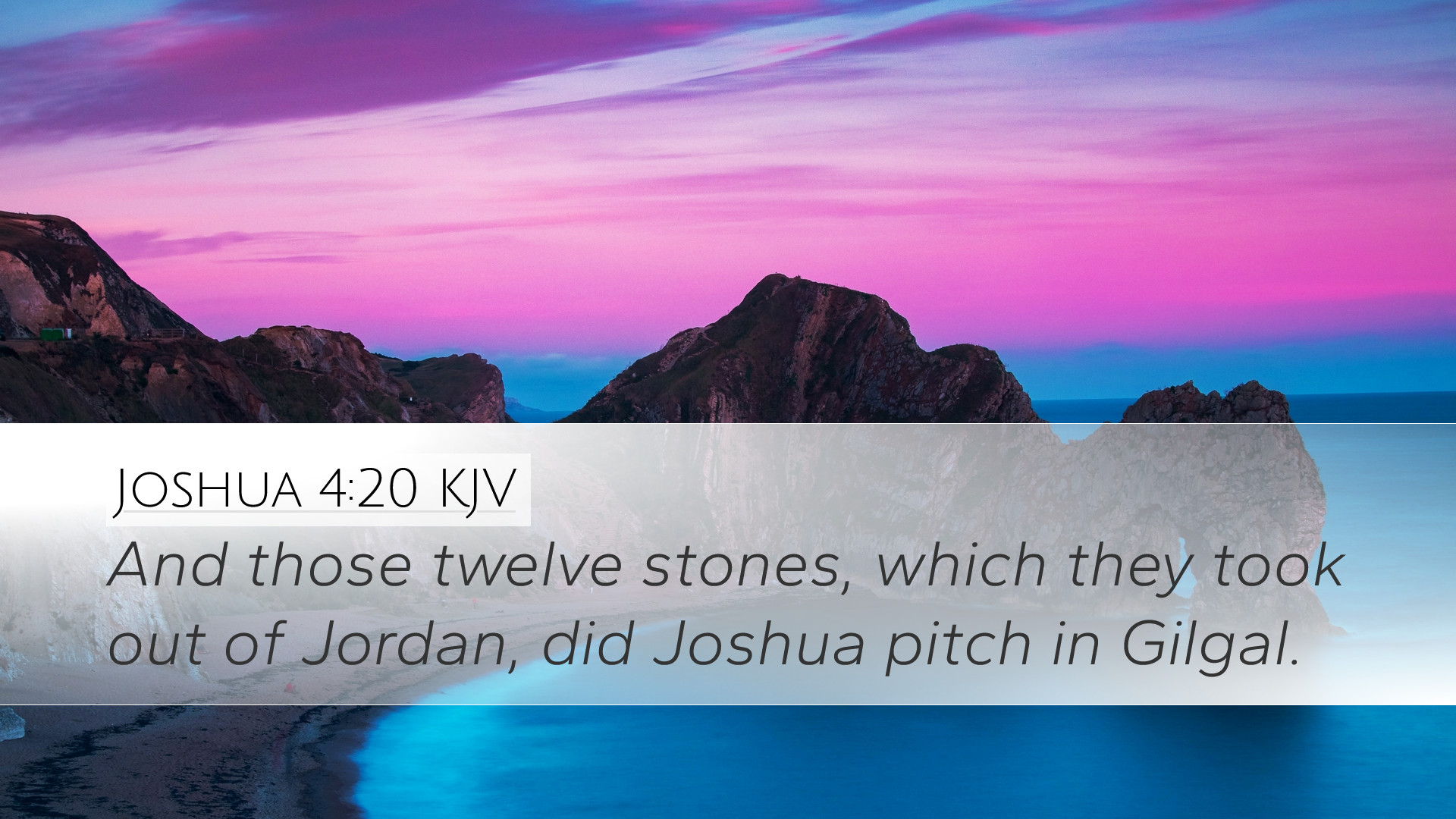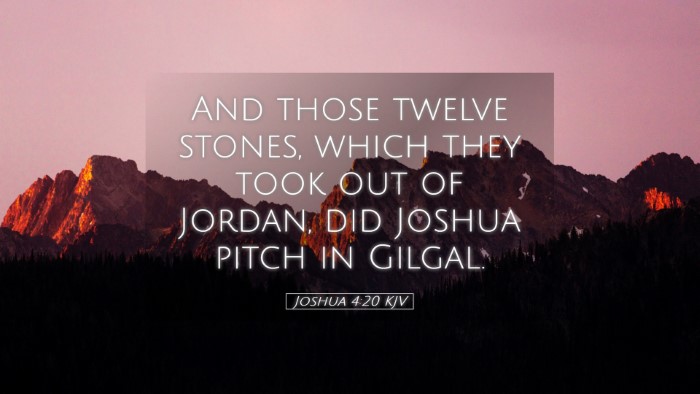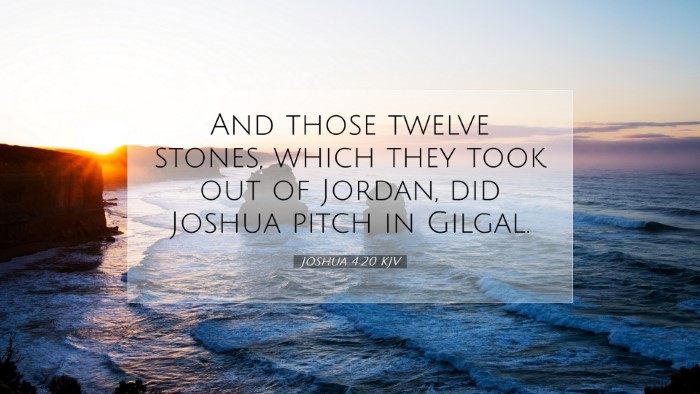Old Testament
Genesis Exodus Leviticus Numbers Deuteronomy Joshua Judges Ruth 1 Samuel 2 Samuel 1 Kings 2 Kings 1 Chronicles 2 Chronicles Ezra Nehemiah Esther Job Psalms Proverbs Ecclesiastes Song of Solomon Isaiah Jeremiah Lamentations Ezekiel Daniel Hosea Joel Amos Obadiah Jonah Micah Nahum Habakkuk Zephaniah Haggai Zechariah MalachiJoshua 4:20
Joshua 4:20 KJV
And those twelve stones, which they took out of Jordan, did Joshua pitch in Gilgal.
Joshua 4:20 Bible Commentary
Commentary on Joshua 4:20
Text of Joshua 4:20 (KJV): "And those twelve stones, which they took out of Jordan, did Joshua pitch in Gilgal."
Introduction
This verse captures a significant moment in Israel’s history as they cross the Jordan River into the Promised Land. Here, Joshua sets up twelve stones as a memorial, which symbolizes God's faithfulness and serves as a reminder to future generations. Various public domain commentaries provide profound insights into the implications of these actions, offering valuable lessons for pastors, students, theologians, and Bible scholars alike.
Significance of the Stones
The twelve stones mentioned in this passage represent more than mere physical objects; they are a tangible testimony of God's miraculous intervention and faithfulness.
- Matthew Henry: He explains that the stones serve as a perpetual reminder of Israel's deliverance from Egypt and their journey through the wilderness to the Promised Land. These stones symbolize victory over barriers, emphasizing that God empowers His people to overcome challenges.
- Albert Barnes: Barnes notes that these stones were chosen deliberately from the center of the Jordan River, indicating a definitive act of God's power as He dried up the river for His people to pass. This act not only displayed God's might but also reassured the Israelites of His constant presence.
- Adam Clarke: Clarke extends this imagery by asserting that the stones were a divine arrangement to ensure future generations would not forget the mighty works of the Lord. The memorial exemplifies the importance of collective memory in faith and community.
Lessons for Today
The implications of Joshua 4:20 extend beyond the historical narrative and challenge believers today to remember and celebrate God's faithfulness.
- Memory and Remembrance: The stones serve as a reminder of the importance of remembering God's past faithfulness. This theme is echoed throughout Scripture, where God's people are repeatedly called to commemorate His deeds (Psalm 78:4).
- Generational Teaching: The verse emphasizes the necessity of teaching future generations about God's works. Pastors and educators can glean from this the importance of instilling faith and knowledge of God's deeds in youth (Deuteronomy 6:6-7).
- The Power of Worship: Setting up a memorial signifies a public acknowledgment of God's greatness. It encourages communal worship and acknowledgment of God's interventions, reinforcing the church's role in remembering God's goodness as a community.
Reflections for the Community of Faith
The installation of the stones at Gilgal provides several reflections for contemporary faith communities:
- Identifying Milestones: Churches and theologians might consider establishing their own memorials—whether through testimonies, ceremonies, or symbolic objects to mark significant acts of God in their communities.
- Encouragement in Adversity: Just as the Israelites faced the daunting task of crossing the Jordan, believers today encounter various challenges. The stones remind us that God is present in our struggles and faithful to lead us through.
- Inclusivity of the Community: The twelve stones represented the tribes of Israel. In the modern church context, this can serve as a reminder of inclusivity, calling every member of the community to be a part of God's ongoing story.
Theological Implications
The act of setting up the stones carries theological weight, especially concerning the nature of God and His covenant with humanity:
- Covenantal Faithfulness: These stones reflect God's unbreakable covenant with Israel. This suggests an overarching narrative in Scripture that indicates God's faithfulness is a continual theme from the Old Testament to the New Testament.
- God’s Sovereignty: The crossing of the Jordan under divine guidance underlines God's sovereignty. The miraculous drying of the river showcases God's control over creation and His willingness to intervene on behalf of His people.
- Christ as the Fulfillment: The stones can be viewed typologically; with Christ as the ultimately fulfilling stone, the cornerstone of faith (Ephesians 2:20). The memorial serves as a type pointing to the greater deliverance found in Jesus.
Conclusion
In Joshua 4:20, the act of setting up the stones embodies a powerful moment of commemoration and instruction for both past and present believers. By analyzing this single verse, we uncover themes of remembrance, community, divine intervention, and ongoing faithfulness. Pastors and theologians are encouraged to foster environments within their ministries that echo these profound insights of God's enduring presence and power. As believers reflect on their experiences and establish their own memorials to God's acts, they engage in the ancient tradition of calling to mind the great works of the Lord that shape their faith and community.


